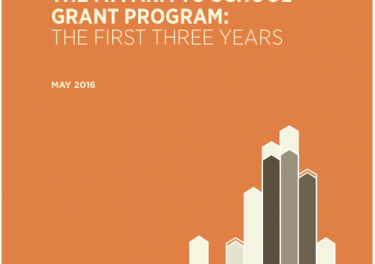Michigan Farm to School Grant Program

Farm to school is considered a win-win-win for kids, farmers, and communities. The story of the MI Farm to School Grant Program, established in 2011 and continuing today, is now available in one comprehensive report from the MSU Center for Regional Food Systems.
Read how MI Farm to School Grant Program has helped food program providers overcome challenges and stimulate or sustain local food purchasing programs at K-12 schools and early childhood programs in Michigan.
The report, The MI Farm to School Grant Program: The First Three Years, includes:
- why the program was started;
- a summary of the program, including operations and impacts from 2011-2014;
- reflection on the sustainability of the sponsored farm to school activities;
- learnings from the process of administering the program;
- suggestions for adapting the program as a model for other communities, states or regions.
This report is part of a suite of farm to school resources available from MSU Center for Regional Food Systems at www.mifarmtoschool.msu.edu, including the most recently released step-by-step guides: Farm to Early Childhood Programs: A Step-By-Step Guide and Garden to Cafeteria: A Step-By-Step Guide.
The MI Farm to School Grant Program is administered by MSU Center for Regional Food Systems. It is funded by the W.K. Kellogg Foundation as part of broader Michigan Farm to School efforts including Hoophouses for Health, a partnership with the Michigan Farmers Market Association and the MSU Department of Horticulture.
About the Center for Regional Food Systems:
Our vision is a thriving economy, equity, and sustainability for Michigan, the country, and the planet through food systems rooted in local regions and centered on Good Food: food that is healthy, green, fair, and affordable.
We join in MSU’s pioneering legacy of applied research, education, and outreach. We do this by catalyzing collaboration and fostering innovation among the diverse range of people, processes, and places involved in regional food systems. Working in local, state, national, and global spheres, our projects span from farm to fork, including production, processing, distribution, policy, access and more.
We value leveraging broad perspectives and disciplines to realize our vision, so there are two ways for MSU faculty and staff to engage in our work: as staff or as an affiliate. Nearly 70 MSU faculty and staff from 17 units, including eight colleges, AgBioResearch, and three MSUExtension institutes are formally affiliated with the center. Our 20 staff members are based in either the Department of Community Sustainability or the Department of Horticulture – the latter largely through MSU Student Organic Farm.
We believe in collective impact: the idea that complex social problems are best solved when organizations in diverse sectors actively commit to a common agenda. To this end, we function as a collective impact “backbone organization,” convening partners across the state to promote food that is healthy, green, fair and affordable.








 Your Privacy Choices
Your Privacy Choices
i want to start farming and i need financial assistance